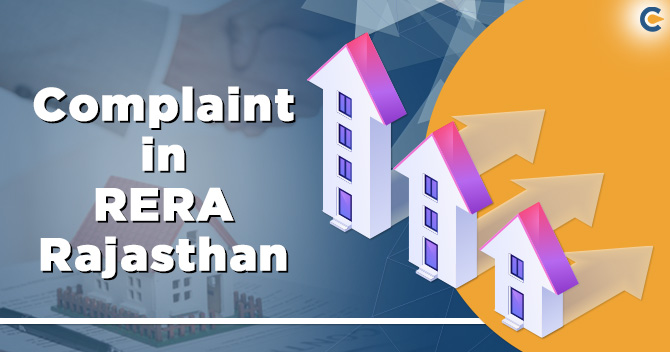The real estate sector is one of the most progressive industries in this country. This infrastructure service has become one of the driving factors behind the growth of our country, and it is one of the world’s fastest-growing markets. The real estate industry is an essential component of any economy. It plays a vital role in meeting people’s housing and infrastructure needs and demands. Though the sector has grown significantly in recent years still, there has been the absence of standardisation and a lack of adequate buyer protection.
The introduction of RERA Act by the Central government was a smart move. The Real Estate (Regulation and Development) Act of 2016 serves as a ground for both the developer and the buyer so that risks faced by them can be lowered down; it also re-invested the people’s trust in the Indian real estate industry. While the government was enacting the RERA Act, it had a lot of issues in front of them, like increasing housing infrastructure demands, arbitrary practices by the private players, and consumer exploitation to overcome.
RERA act aims to protect the interest of Indian buyers by establishing the Real Estate Regulatory Authority. The authority aims to provide a grievance system in the real estate sector.
In order to avoid unwarranted delays in the construction and delivery of the projects, it also strives to increase the credibility of the Promoters, Real Estate brokers, and agents. The RERA Act stipulates that an Appellant System for Grievance Redressal must be established, and defaulters must pay fines and fees. Problems between developers and buyers occurred prior to the implementation of the Act because there were no consistent norms and regulations that had to be followed, and there was no effective procedure for resolving these conflicts.
About Real Estate (Regulation and Development) Act of 2016
Historical Perspective
Before the RERA Act came into existence, the real estate sector was struggling as there were no confined laws governing it. There was a need to appoint a comprehensive regulatory body to oversee the issues of the real estate sector, therefore in the year 2009, a conference of National Housing Development and Municipal Administration was held to discuss the issues related to affordable housing to all, including the land-use policies, financial strengthening of the local public bodies. After the discussion, a draft of the Real Estate Bill was created to address the issues relating to the land valuation system and urban development regulation. Finally, on August 14 2013, the UPA government introduced the RERA bill in the Upper House (Rajya Sabha). The bill was then sent standing committee for further examination. On February 13, 2014, the Standing Committee presented its report after taking into consideration the views of different NGOs working in the field of real estate, the Mo HUPA, also known as the Ministry of Housing and Urban Poverty Alleviation. After this, the Union Cabinet, under the chairmanship of Prime Minister Shri Narendra Modi, approved the amendments to the bill. Finally, the bill was passed by the Upper house and the Lower house (Lok Sabha) on March 2016 and with this the Parliament enacted the Real Estate (Regulation and Development) Act, 2016 also called as the RERA Act. The aim of the Act is to protect the rights and interests of the consumers by minimising the activities of malpractice done by the developers, also to promote the practice of uniformity in the real estate business. The Real Estate (Regulation and Development) Act[1] got the President’s assent on March 25, 2016. At the time of publishing the in the official Gazette only with the 61 sections were notified, and the remaining 32 sections of the RERA Act came into existence on May 01, 2017.
Important Sections
The provisions of the Act applies to the residential apartments, buildings as well as to plots, whether residential or commercial. Act mandates all the projects of 500 sq. metres to get the registration certificate as per the provisions of the Act. Before we move forward, let’s look at some of the important sections under the Act. The sections are as follows:-
Chapters II of RERA Act registration of real estate project and registration of real estate agents.
- Section 3 of the Real Estate (Regulation and Development) Act of 2016 talks about the prior registration of real estate projects with Real Estate Regulatory Authority.
- Section 4 of the Real Estate (Regulation and Development) Act of 2016 talks about the application for registration of real estate projects.
- Section 5 of the Real Estate (Regulation and Development) Act of 2016 talks about the grant of registration.
- Section 6 of the Real Estate (Regulation and Development) Act of 2016 talks about the extension of registration.
- Section 7 of the Real Estate (Regulation and Development) Act of 2016 talks about the revocation of registration.
- Section 8 of the Real Estate (Regulation and Development) Act of 2016 talks about the obligation of the Authority consequent upon the lapse of or on the revocation of registration.
- Section 9 of the Real Estate (Regulation and Development) Act of 2016 talks about the registration of real estate agents.
- Section 10 of the Real Estate (Regulation and Development) Act of 2016 talks about the functions of real estate agents.
Chapter III of RERA Act talks about the functions and duties of promoters
- Section 11 of the Real Estate (Regulation and Development) Act of 2016 talks about the functions and duties of a promoter.
- Section 14 of the Real Estate (Regulation and Development) Act of 2016 talks about the adherence to sanctioned plans and project specifications by the promoter.
- Section 15 of the Real Estate (Regulation and Development) Act of 2016 talks about the obligations of a promoter in case of transfer of a real estate project to a third party.
- Section 16 of the Real Estate (Regulation and Development) Act of 2016 talks about the obligations of promoters regarding the insurance of real estate projects.
- Section 17 of the Real Estate (Regulation and Development) Act of 2016 talks about the transfer of titles.
- Section 18 of the Real Estate (Regulation and Development) Act of 2016 talks about the return of amount and compensation.
Chapter IV of RERA Act talks about the rights and duties of allottees
- Section 19 of the Real Estate (Regulation and Development) Act of 2016 talks about the rights and duties of allottees.
Chapter V talks about the real estate regulatory authority
- Section 20 of the Real Estate (Regulation and Development) Act of 2016 talks about the establishment and incorporation of the Real Estate Regulatory Authority (RERA).
- Section 36 of the Real Estate (Regulation and Development) Act of 2016 talks about the power to issue interim orders.
- Section 37 of the Real Estate (Regulation and Development) Act of 2016 talks about the Powers of Authority to issue directions.
- Section 40 of the Real Estate (Regulation and Development) Act of 2016 talks about the recovery of interest or penalty or compensation and enforcement of an order, etc.
Projects that does not fall under the ambit of RERA Act
The real estate projects mentioned below do not required any registration under the RERA Act of 2016:-
- A project in which are of land does not exceed more than five hundred (500) sq. metres;
- The number of apartments in the project does not exceed from eight (8);
- In case of project’s renovation, redevelopment and repair, also the renovation or repair should not involve any marketing or advertisement;
- In a case where promoter has received the completion certificate for the project, before commencing of this act.
Registration of real estate projects under the RERA Act
Section 4 of the RERA Act of 2016 talks about the application for registration of real estate projects in India. Each and every promoter whose area of land for the project is more than 500 sq. meters or the number of floors in the project are more than eight (8) must get the registration from the authority. For this, the prompter has to follow the steps mentioned below:
- Under step 1: For the RERA registration, the applicant has to file the application form along with the required documents and fee;
- Under step 2: The authorities will then accept or reject the application form, within a period of thirty (30) days from the date of receiving such application;
- Under step 3: If the authority accepts the application form of the applicant, it will issue a registration number along with the login details of a user ID for future reference.
Granting of registration under RERA ACT
The grant of registration for the real estate industry has been discussed under Section 5 of the RERA Act of 2016.
- For granting a project the authority has a time period of 30 days from the date of receiving an application of registration. If the authority grands the permission to register a real estate project, it must issue a registration number and create the login details of the applicant on the website of the authority.
- If Authority decides to reject the application form, then they must give an opportunity to the applicant to present his case to satisfy the authority with proves.
- According to the Section 5 sub-clause 1, if authority fails to provide the registration within a period of 30 days, then project will be automatically deemed to be registered and the promoter must be given the login details to the website, so that he can upload the details of the real estate projects for the buyers.
- The registration so granted under this section is valid for the time specified by the promoter in section 4 under sub-clause (c) for the completion of the project.
Process of registration under the RERA Act
- Process for the promoters of the real estate projects
- The promoter must prepare a check list and collect all the required documents.
- After that the promoter needs to open a bank account as per Section 4(2)(I)(D) of the RERA Act
- Then submit the application form A for registering a real estate project and Form B for all the declarations that a promoter is supposed to make as defined under Section 4 of the Act. Along with this the promoter has to submit Form G, this is a draft agreement for the allotment of the project.
- Along with Form G, an affidavit has to be submitted to state the authenticity of details.
- Then submit one more affidavit stating that no booking amount from the buyers has been taken by the promoter as per Section 3 of the RERA Act.
- Finally the promoter can send the duly signed copy of the application to the relevant RERA Authority along with the prescribed fee.
- Process of registration for the real estate agents
- Step one includes filling out the application form and submit it along with the prescribed fee to the relevant RERA Authority.
- After that the authority will issue a registration number. This number has to be mentioned for all the property sale done by the real estate agent;
- Thereal estate agent is required to maintain the books of account, record of all the sales made on the quarterly basis. Also as per the provisions of the Act, agent must share all the information and documentation related to the real estate project.
Extension of registration under Section 6
Most of the times there is a delay on the developers end to deliver the project to the buyers on prescribed time. The Act was passed to prevent these delays. As per the provisions of the Act, the developer is required to declare the time period in which it will be turned over to the buyer. The timeframe must be clearly defined because if the project is not completed within the allotted period, the regulator may usurp control and withdraw the licence.
According to this Section 6 of the RERA Act, the authority has the power to grant a registration extension to the developer. The regulatory body may consider the conditions of force majeure or any other reasonable situation to justify the prolongation.
The promoter must submit an application describing the event of force majeure or the reasonable circumstances that contributed to the delay in the manner and with the payment of the applicable charge as determined by the regulatory authority from time to time.
Condition for revocation of registration
According to Section 7 of the RERA Act, the authority may cancel the registration number under the following circumstances.
- If the promoter disregards the rules set forth in this Act.
- If the promoter violates any of the terms or conditions of the competent authority’s permission,
- If the promoter neglects to take any action required by or under this Act or the rules or regulations adopted thereunder,
- If the promoter engages in any unethical behaviour or irregularities.
Note: When the promoter’s registration is revoked, the authority will deny him access to the website with reference to the project he undertook, list his name on a list of defaulters, and post a picture of him there. Additionally, he is required to notify the other real estate authorities in the other States and Union Territories of the revocation.
Advantages of RERA: Buyer’s perspective
Following is the list of all the advantages that a buyer can enjoy:-
- Risk of delay is avoided
- No excess charges
- Transparency
- Liability
- Quick redressal
Advantages of RERA: Builders’s perspective
Following is the list of all the advantages that a buyer can enjoy:-
- Adequate financial inflow
- Increased competition
- Better functioning
- Imposition of penalty
- Transparency
Impact of RERA Act on real estate industry
RERA’s implementation has seriously disrupted corporate operations. The real estate industry has made a substantial economic contribution to the nation, but this legislation has hurt the sector and all builders are currently in financial trouble because the Act directly affects home pricing and home loan interest rates. The industry is struggling financially and has faced several challenges. RERA’s implementation has seriously disrupted corporate operations. The corporate world has been significantly impacted by RERA. Demonetisation’s implementation was already problematic, but when RERA was also put into effect, it caused widespread outcry. Due to current legislation, the real estate industries of many states in India are becoming more transparent and reliable. It is believed that everyone or any buyer will benefit over time. Technology-enabled systems that can manage larger data quantities and are not yet recognised by many countries can expand the Act’s scope and spirit. Due to the increasing attention being paid to the Act’s implementation, the anticipated benefits are likely to increase.
Conclusion
It is crucial for you to only choose a project that has been registered under RERA Act, as a house buyer if you want to avoid future losses and ensure the security of your investment. The Act is a big step forward in terms of strengthening market transparency, raising developer and promoter accountability, and establishing efficient mechanisms for grievance resolution. There will be fewer litigation because there are strict rules and restrictions in the highly corrupt business. The creation of rules like RERA is a significant advancement in terms of increasing customer, promoter, and builder awareness. The RERA Act has taken appropriate and consistent actions to encourage the development of the sector because it is committed to the successful and effective implementation of the nation’s real estate law. Numerous policy decisions made in accordance with the RERA will unquestionably result in substantial advancements in the economic and social transformation, hence promoting the long-term growth of the RERA and a customer-friendly environment. Due to greater transparency, RERA not only serves to defend the interests of homebuyers but also to the advantage of builders. It offers a variety of tools to make transactions in commercial and residential projects easier and more regulated, and it guarantees that project promoters will finish their work on schedule.
Read our Article: Detail Analysis About RERA Act 2016











